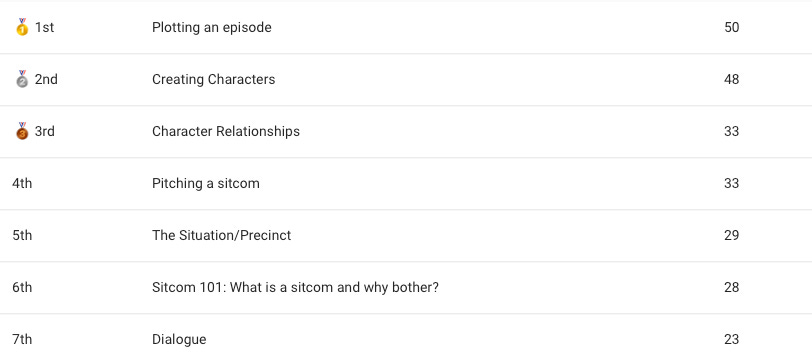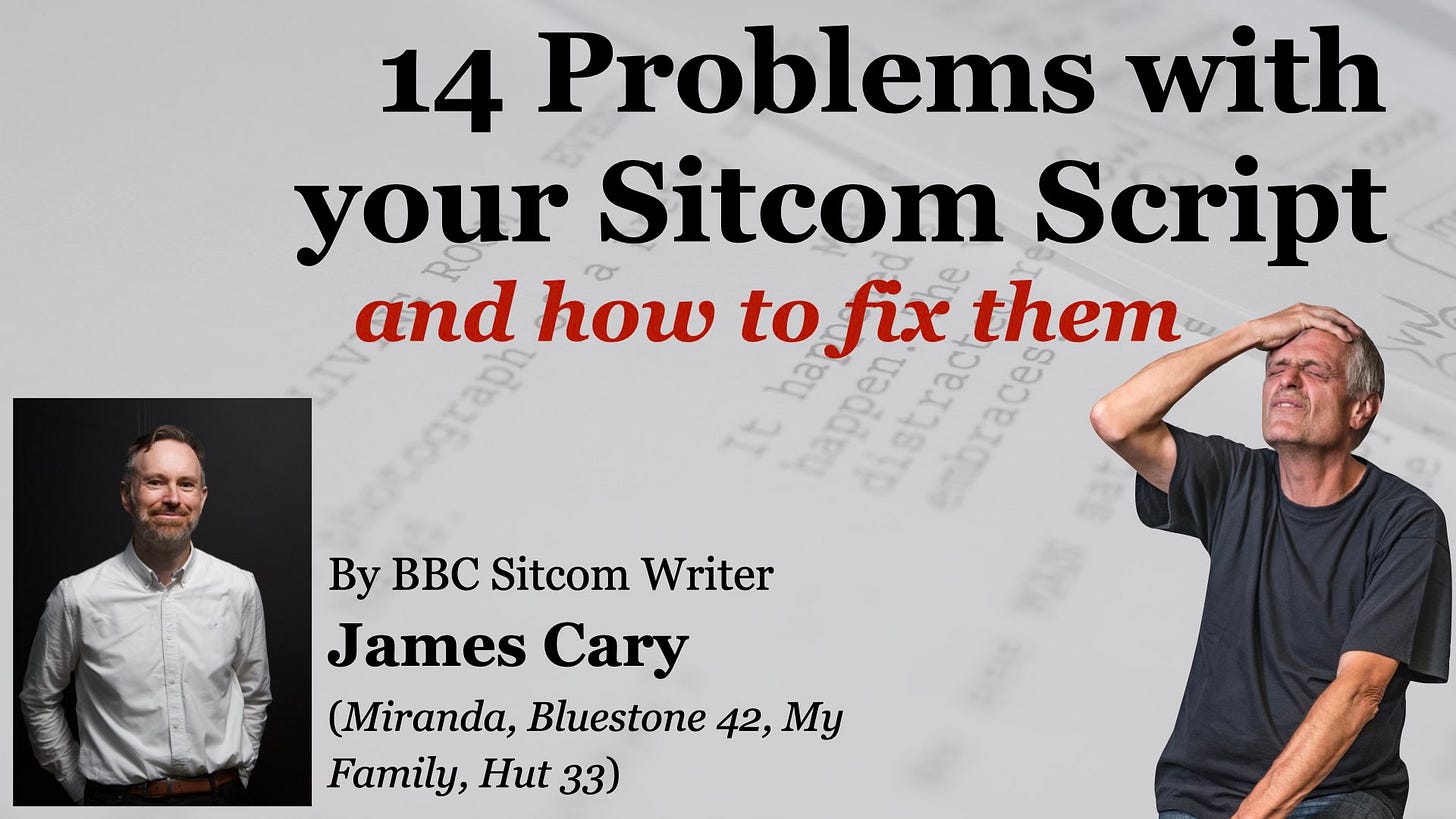Have you done my survey yet? I've put up a list of nine fairly obvious topics that I could cover in some pay-what-you-like webinars. Could you rank them in order of preference for what you like me to talk about? And if what you’re after isn’t there, add your own to the survey!
Could you do that now? It’ll only take a minute or two. Here’s where are at the minute:
Okay, back to Writing That Sitcom:
I was going to call this section ‘From Script to Screen.’ I didn’t, mainly because I wanted the chapters all to follow the format ‘Something your Sitcom’. But also the title would have been too optimistic, giving a false impression that it’s just a process, or a matter of time before your script ends up on the TV screen.
There isn’t really a process. Not in Britain. There are customs and widespread practices, but nothing set in stone. You might get a series commission from a script. You might have to make two pilots before a channel controller begrudgingly lets your show go out.
In America, with the networks, at least, there does seem to be a strict regimented process. This is all because advertising space needs to be sold. Fair enough. It appears that the likes of Amazon and Netflix are chipping away at that model, and that’s all to the good. Is their system better than the haphazard British shambles? Who can say?
We can’t change the system, so we must deal with the harsh realities of life and learn the lesson. And there is a brutal lesson round the corner. So let’s deal with it here.
Now You See It
You’ve been slaving away on your sitcom script for months - maybe years – and lo and behold, there it is. On TV. Or spewing out of your radio. Starring Paul Whitehouse and Alison Steadman, or whoever. Someone’s beaten you to the punch with something similar to your ideas. They haven’t nicked it. They just got there first. You’re angry right now. I get that. Given your rage and disappointment, you will find this show to be inferior, flawed, stupid, badly made and unfunny.
Let me give you some time to grieve.
You done yet?
Okay. The bad news is that that’s not all the bad news All is not lost. Here’s the thing. And you’ll need to brace yourself because I need to let you in on a secret. Ready?
They were never going to make your show anyway.
Sorry.
Not because it’s a bad idea. Or badly written. Although maybe it is a badly- written bad idea. Or a well-written bad idea. Or a badly-written good idea. Let us remember hardly any pilot scripts actually get made. The BBC is sent thousands every year. As are independent production companies. Also bear in mind that, tens of thousands of students have graduated with BAs or MAs in screenwriting in the last few years alone. There are a lot of scripts out there.
And most of these scripts don’t get made and most likely never will be. They can’t be. Situation comedy is one of the most expensive forms of television, costing at least £250k per episode. It can be made for less, but it tends to look a bit rubbish. It can cost more. But here’s the point. A series of six is going to cost £1.5 million. There aren’t many channels that can afford to make a sitcom, especially given that most shows, for various reasons, tend not to work very well.
Getting Perspective
I write all this to put your work in perspective. You may well have been reared by Disney and Pixar, and watched movies that preach that if you really believe in yourself, you can do it. You can compete with people who’ve given their whole lives to be being good at something and do it better than them because you may not have experience, and contacts, but you do have talent and self-belief.
Cue: Swelling music, a victory parade and cries of ‘you did it!’ while experienced pro curses, hits side kick and stomps off.
Roll credits next to animated ‘outtakes’.
Fade.
This is not how the un-animated world tends to work. Every now and then, some young hotshot, or complete outsider writes a hit sitcom and that’s great. They capture a moment, or an attitude, at just the right time and it works. These are the exception, not the rule. And it usually turns out they’d been writing since they were eleven, or had a lot of help. And that’s as it should be. Writing sitcoms is incredibly hard.
This is not intended to depress you. It’s all about realistic expectations. To succeed in a writing a sitcom takes ages – especially TV. I’ve been working in the industry for about fifteen years and in all that time, I’ve sold one TV show. One. Just one. In fifteen years. I’ve worked on other TV sitcoms that I did not get commissioned (Miranda, My Hero, My Family). More on writing on other people’s shows in later chapters. I’ve sold three radio sitcoms (Think The Unthinkable, The Pits and Hut 33) – where the odds of succeeding are better. More on writing for Radio in the next section. But bear in mind all three sitcoms were cancelled before I wanted to them to be.
Moreover, despite my experience, track record and award nominations and all that, I regularly attend meetings that don’t go anywhere, pitching sitcoms no-one wants, and sending follow-up emails that aren’t even acknowledged, let alone answered. I had that a couple of months ago: a meeting with a big TV production comedy where I pitched an idea they liked. I wrote it up and sent it to them, and heard nothing. Still haven’t. It happens to all of us.
Here’s the other thing about your script and you won’t like this either. Ready? Your script isn’t actually that good. Again, it’s nothing personal. It’s just that most scripts aren’t all that good. Including my own. Especially if it’s an unproduced first draft or pilot episode. There’s no point getting grand about this. Remember the Hemingway Theory of First Drafts? He wrote first drafts like the rest of us. And he thought his weren’t all that great. Who are we to disagree? Not least because we never read them.
Brace Yourself One Last Time
The experience of seeing your idea done by someone else is painful, but not uncommon. And these other people who’ve stolen a march may be better connected and more experienced and the whole thing seems desperately unfair.
But Hemingway’s still here and he’s telling you to man up. He might have morphed into Ron Swanson. I can’t quite tell. Either way, we all need to realise that if we’re aspiring to have our work on national TV or Radio, we are in with the big boys. If you have a show that you think is perfect for BBC2, remember you’re competing for
budgets and airtime with Paul Whitehouse, Armando Iannucci, Sue Perkins, Jo Brand, Mitchell and Webb and all those people who are funny and talented, and have consistently proved this over at least a decade.
Victory is Possible
The fact is you do have a realistic crack at a slot of primetime television. You need to bang out about 5500 words on a word-processor. The choice and order of those words takes time, passion, experience, heart, tears, soul and pain. And that’s just for the first draft and we already know about that. But it can be done.
The number of script initiatives and competitions suggest that you might have inadvertently knocked out a script that could be your ticket to winning the sitcom lottery. Your script is not a lottery ticket. At best, the script is a ticket into a large and confusing nightclub which contains strange people, odd conventions and a few secret rooms that most of us don’t know about.
Moving On
As for that script you’ve already written, let’s think about some positive ways forward. Firstly, let’s check a few things:
Are your shows really the same?
What’s your show about? And what’s the show that’s already on telly about? Are they really about the same thing? The setting may be superficial in either show. Both shows are set in, say, a betting shop. But is your show really about gambling? It shouldn’t be. It should be about a gambler, which is not quite the same.
Maybe your show is about an optimist. Or a dreamer. Or a brother and a sister. Or a stage of life. Could the characters that embody this meet in a universal location, like a pub? Or a flat? Does it really have to be set where it is? It could be moveable. And moving it might be the best thing you ever did.
Room for Two
Your show might be a masterful cocktail of character, situation and story, making a magnificent melange that can’t be moved or changed. But it might feel sufficiently different from the other show so the similarity not to be a problem. Recently, the BBC had two sitcoms set in schools, Bad Education and Big School, as well as a drama called Waterloo Road. And The 4 O’Clock Club on CBBC. And it’s not a problem. They appeal to different audiences. So there may be hope.
It’s unlikely that one channel would show a comedy about exactly the same idea, but we do have more channels buying original comedy than ever before – BBC1, BBC2, BBC3, BBC4, ITV1, ITV2, Channel 4, E4, Sky1, Sky Atlantic, Sky Living, Dave, UK Gold and Comedy Central. That’s 14 channels. Plus BBC Radio.
But let’s not get carried away. There are lots of channels, but competition for these channels is intense. And I repeat: your idea is going for the same slot as Harry Enfield’s or Jennifer Saunders’ or Sam Bain and Jesse Armstrong’s. You’re in with the big boys.
So what’s the point? The point is that you have a script. And the setting is not the most important thing. It’s all in the execution (as they said to Charles the First). Your script should be demonstrating that you can execute an idea in a half-hour script with memorable characters, original stories and funny jokes. This script is a sample of what you can do. You’re not just trying to sell a show, but yourself. This script is all about opening doors for you.
Make Your Script Work For You
Let’s picture our producer sitting at her desk with a pile of scripts. She is someone who needs writers. She may have a sitcom in production that needs writers. She may be assembling a team of writers for a new thing you don’t know about yet. She may be open to lots of ideas – maybe even the one you’ve written. Whatever the outcome, your script needs to show her that you can write.
Here’s a reason to be cheerful. If your script is any good – any good at all – they’ll phone you back. They’ll want to meet. Writing sitcom is really hard. It’s black magic and anyone who shows any sign of being able to pull a rabbit out of a hat, dead or alive (the rabbit that is), will attract some interest.
Send out your script and you might get invited to write on shows that are already on TV. Or types of TV or media that you hadn’t considered writing for that you end up enjoying, especially if you get paid for them. Or it leads to constructive meetings which create fruitful relationships, through which you learn key information so you know what project to write next. It might be an untapped area that appeals to a particular rising star that this producer has access to, or has been trying to find a vehicle for – and it’s a world you happen to know a lot about. Your script might show the producer that you are just what they’re looking for.
The last lot of episodes/chapters have been about self-editing and improving your script so you’re sending out the best, tightest, funniest sitcom script you can. Need some help with that?
Why not get this PDF that comes with a 90 minute webinar which gives you 14 ways your script can improve?:
















Share this post